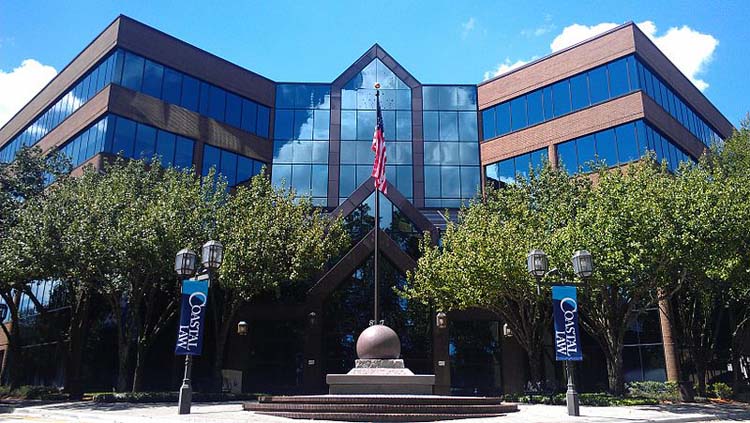"I't private property," CLINE kept saying, threatening arrest. He lied. The World Golf Village Convention Center was indisputably owned
This is your UnderSheriff.
Is Matthew CLINE an uneducated bully?
I feel sorry for MATTHEW CLINE and his being a FLORIDA COASTAL SCHOOL OF LAW alumni (like Clerk of Courts HUNTER CONRAD, another violator of Open Records Laws). He might not be so quick to violate civil and constitutional rights if he had the benefits of a decent legal education.
Overcharged and undereducated. Screwed, blued and tattooed by INFILAW, owned by a hedge fund, whose business model has led two of its three for-profit law schools to close their doors. INFILAW's Arizona and North Carolina for-profit law schools are closed.
Will the ABA accreditation proceeding against FIRST COASTAL SCHOOL OF LAW the final nail in INFILAW's coffin?
From American Bar Association Journal:
Florida Coastal still out of compliance with accreditation standards, ABA legal ed council says
POSTED

Florida Coastal College of Law. Photo by Waters2100, via Wikimedia Commons.
The ABA Section of Legal Education and Admissions to the Bar has affirmed its findings that Florida Coastal School of Law is out of compliance with certain accreditation standards—increasing the likelihood that the matter will be settled in court.
The decision rebuffs an appeal from Florida Coastal, which the ABA originally found out of compliance in October of 2017. The council found after a March hearing that it had come into compliance with one of the standards but maintained that most of the problems it had identified still existed.
Florida Coastal appealed that decision, which was rejected at an August meeting of the Accreditation Committee of the section’s council.
The decision may revitalize a lawsuit over the matter. Florida Coastal sued the ABA in May, saying the council is biased against for-profit law schools. A federal district judge for the Middle District of Florida denied the school a temporary restraining order in July, saying action wasn’t appropriate while the appeal was pending.
With the appeal concluded, the school could renew its request for a temporary restraining order against the ABA. Florida Coastal Dean Scott DeVito told the ABA Journal that the law school is currently in the process of reviewing the ABA’s decision and discussing it with its attorneys.
In its lawsuit, Florida Coastal had originally requested that a judge enjoin a requirement to post on its website the ABA’s statement that it is out of compliance with these admissions standards:
- Standard 301(a), saying law schools must have a rigorous program to prepare students to pass the bar exam and ultimately practice law
- Standard 309(b), outlining standards for academic support that gives students “a reasonable opportunity” to finish school
- Standard 501(b), requiring law schools not to admit students who do not appear capable of graduating or passing the bar
- Interpretation 501-1, outlining factors to be considered in admissions
The Accreditation Committee had earlier said the school was also out of compliance with Standard 501(a), requiring sound admissions policies, but reversed itself after a March hearing. Its ruling after the August hearing reiterates its requirement that Florida Coastal take remedial actions, including post public notice on its website about being out of compliance with various accreditation standards and providing this information to admitted students; developing a plan for coming into compliance; and providing students the school’s first-time bar passage rates for recent graduates taking the Florida and Georgia bars.
Florida Coastal has pushed back against these findings, arguing that its bar passage are were above average compared to other Florida law schools. In court, it has argued that the ABA is biased against law schools owned by Florida Coastal’s parent company, InfiLaw, “because of its proprietary status.” Florida Coastal also argued that the U.S. Department of Education, under then-President Barack Obama, pressured or encouraged the ABA to take adverse actions against for-profit law schools. InfiLaw is owned almost entirely by a private equity company, Sterling Partners.
Two other InfiLaw schools, Arizona Summit School of Law and the Charlotte School of Law, have also sued the ABA; all three argue that the council denied them due process. Arizona Summit lost ABA accreditation approval in June, and the school is not holding classes this fall. Charlotte School of Law lost its accreditation and was forced to close under North Carolina state law.
A former student and professor at the Charlotte school have also sued the ABA, arguing that it should never have approved the school’s accreditation in the first place.
Barry Currier, the ABA’s managing director of accreditation and legal education, did not immediately respond to a request for comment.
Updated at 5:03 p.m. to include response from DeVito.
No comments:
Post a Comment